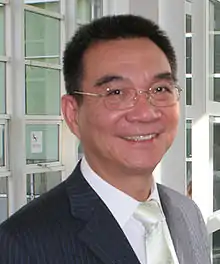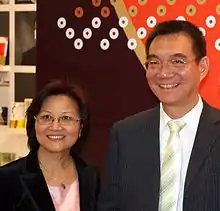Justin Yifu Lin
Justin Yifu Lin (Chinese: 林毅夫; pinyin: Lín Yìfū), born on October 15, 1952, in Yilan County, Taiwan, as Zhengyi Lin, (simplified Chinese: 林正义; traditional Chinese: 林正義; pinyin: Lín Zhèngyì) is a Chinese economist.
Justin Yifu Lin | |
|---|---|
 | |
| Born | October 15, 1952 |
| Nationality | Chinese PRC from 1979 ROC until 1979 |
| Institution | World Bank Peking University |
| Field | Political economy |
| Alma mater | Republic of China Military Academy (Infantry) National Chengchi University (MA) Peking University (MA) University of Chicago (PhD) |
| Doctoral advisor | D. Gale Johnson Theodore Schultz Sherwin Rosen |
| Information at IDEAS / RePEc | |
Lin is a former Taiwanese military officer who defected to Mainland China in 1979. Lin transferred from a soldier to an economist when he started studying economics at Peking University and later went on to pursue a Ph.D at the University of Chicago. After finishing his doctoral dissertation, he returned to Beijing and became a professor at Peking University, founded the China Center for Economic Research (which was later upgraded to the National School of Development) and was appointed Chief Economist and Senior Vice President of the World Bank where he served from 2008 to 2012.[1] After that, he returned to Beijing and to his research at Peking University.
His main academic theory is called New Structural Economics.
Biography
Early life
Lin was born on 15 October 1952 in Yilan County, Taiwan, as "Lin Zhengyi". Lin attended high school in National Yilan Senior High School. In 1971, he was admitted to the National Taiwan University's College of agriculture to study agricultural machinery under the department of agricultural engineering. Pillsbury remembered Lin being the president of the student body in 1971 while was studying Chinese at the same university.[2] During his military training in 1971, Lin applied to enlist rather than return to the university. He transferred to the Republic of China Military Academy, graduating from its 44th class in 1975.
Early education and defection

In 1976 Lin entered the MBA program at National Chengchi University in Taiwan on a defense scholarship and returned to the army upon receiving his MBA in 1978. As a captain in the Republic of China Army in Taiwan, he defected to Mainland China on May 17, 1979, from the island of Kinmen off the coast of Fujian to the nearby island of Xiamen of Mainland China. Lin left his pregnant wife and his three-year-old child in Taiwan; a year after he defected, he was declared "missing" by the ROC Army and his wife claimed the equivalent of US$31,000 from the government.[3] His wife and their children joined him years later when both of them went to study in the United States.[4] While an officer in the ROC Army, Lin was held up as a model soldier; after his desertion, the ROC originally listed him as missing but in 2000 issued an order for his arrest on charges of defection.[5]
In a letter written to his family in Taiwan about a year after his defection, Lin stated that "based on my cultural, historical, political, economic and military understanding, it is my belief that returning to the motherland is a historical inevitability; it is also the optimal choice."[3][6] A National Taiwan University alumnus Hongsheng Zheng (鄭鴻生) confirmed Lin's reason and motive.[7] Lin's oldest brother said it was unfair to brand his younger brother a traitor. "I don't understand why people regard him as a villain," he said. "My brother just wanted to pursue his ambitions."[4]
Later education and career
Lin received a Master's degree in political economy from Peking University in 1982, and a PhD in economics from the University of Chicago in 1986.
He was one of the first PRC citizens to receive a PhD in economics from The University of Chicago,[8] and is a leading Chinese economist; he serves as a consultant to major international organizations and is on the editorial board of several international academic economics journals.
On September 16, 2008, Fordham University honored Justin Yifu Lin a reception for his being chief economist and senior vice president of the World Bank.[9]
He received an Honorary Doctorate from Fordham in 2009[10] and was elected a Corresponding Fellow of the British Academy in 2010. His 2012 book, The Quest for Prosperity: How Developing Economies Can Take Off, argued for an active role for government in nurturing development, not just through the traditional provision of infrastructure and legal enforcement, but also by identifying and actively supporting industries that contribute to growth.[11]
Lin is the founder and first director of the China Center for Economic Research and a former professor of economics at Peking University and at the Hong Kong University of Science and Technology. He is also an adviser to the China Finance 40 Forum (CF40).[12]
Works
Selected Books
Lin, Justin Yifu, Fang Cai, and Zhou Li. The China Miracle: Development Strategy and Economic Reform. Hong Kong: Chinese University Press, 2003.
Lin, Justin Yifu. Demystifying the Chinese Economy. Cambridge: Cambridge University Press, 2011.
Lin, Justin Yifu. The Quest for Prosperity: How Developing Economies Can Take Off. Princeton, NJ: Princeton University Press, 2012.
Lin, Justin Yifu. New structural economics: A framework for rethinking development and policy. The World Bank, 2012.
Selected Articles
Lin, Justin Yifu. “The Household Responsibility System in China’s Agricultural Reform: A Theoretical and Empirical Study.” Economic Development and Cultural Change 36, no. 3 (1988): 199–224.
Lin, Justin Yifu. “Rural Reforms and Agricultural Growth in China,” American Economic Review, 82 no. 1 (1992): 34-51.
Lin, Justin Yifu and Dennis Tao Yang. “On the Causes of China’s Agricultural Crisis and the Great Leap Famine,” China Economic Review 9, no. 2 (1998): 125–140.
Lin, Justin Yifu. “Competition, Policy Burdens, and State-owned Enterprise Reform,” American Economic Review, 88 no. 2 (1998): 422-27.
Lin, Justin Yifu. and Zhiqiang Liu. “Fiscal Decentralization and Economic Growth in China.” Economic Development and Cultural Change 49, no. 1 (2000): 1–21.
Lin, Justin Yifu. “China and the Global Economy,” China Economic Journal, 4 no. 1 (2011): 1-14
Lin, Justin Yifu. “New Structural Economics: A Framework for Rethinking Development,” World Bank Research Observer, 26, no. 2 (2011): 193-221.
References
- "Justin Yifu Lin Leaves World Bank - Economic Observer Online - In-depth and Independent".
- Pillsbury, Michael (2015). The Hundred-Year Marathon: China' Secret Strategy to Replace America as the Global Superpower. New York: St. Martin's Griffin. pp. 166–167. ISBN 9781250081346.
- Jennifer Chou: World Bank's Chief Economist Swam to China?, The Weekly Standard, February 11, 2008
- "Justin Lin's wife pays her respects". Taipei Times. 2002-06-04. Retrieved 2008-01-22.
- "World Bank economist risks arrest if he visits". Taipei Times. 2008-02-07. Retrieved 2008-02-07.
- 林毅夫 (Justin Yifu Lin) (1980). "给表兄李建兴的信 (A letter to elder cousin Jianxing Li)". Published on Oct-18-2010 (in Chinese). Beijing, China: 爱思想网(http://www.aisixiang.com).
- 鄭鴻生 (Zheng, Hongsheng) (June 15, 2002). "青年林正義之路 (The Road Taken by Youth Zhengyi Lin)". 文化研究月報 (Monthly Cultural Studies). 三角公園 (Triangle Park) (in Chinese). Hsinchu, Taiwan, Republic of China: 中華民國文化研究學會 (Cultural Studies Association of ROC) (16).
- 凤凰网财经人物 (Phoenix Television: The People of Financial Circles), "林毅夫详细资料 (resume of Lin, Yifu)", Phoenix Television, 2010. (in Chinese)
- Howe, Bob (October 14, 2008). "Chief World Bank Economist Honored by Fordham". Inside Fordham University online. Lincoln Center Campus New York, NY 10023: Fordham University.CS1 maint: location (link)
- Teagle, Melanie (2009). "One Hundred Sixty Fourth Annual Commencement". UNIVERSITY COMMENCEMENT. Lincoln Center Campus New York, NY 10023: Fordham University. Archived from the original on 2011-06-22.CS1 maint: location (link)
- Lin, Justin Yifu (2012). The Quest for Prosperity: How Developing Economies Can Take Off Justin Yifu Lin. Princeton, NJ: Princeton University Press. ISBN 978-0-691-15589-0.
- "Organizational Structure". CF40.
External links
| Wikimedia Commons has media related to Justin Yifu Lin. |
- Lin Yifu, China Vitae.
- Justin Yifu Lin biography, CCER website, accessed December 2005.
- World Bank Chief Economist: Justin Yifu Lin
- "Development and Transition: Idea, Strategy and Viability" at the Chinese University of Hong Kong, March 31, 2008
- Economist Lin Yifu says the poor should get rich quicker
| Business positions | ||
|---|---|---|
| Preceded by François Bourguignon |
World Bank Chief Economist 2008–2012 |
Succeeded by Kaushik Basu |
